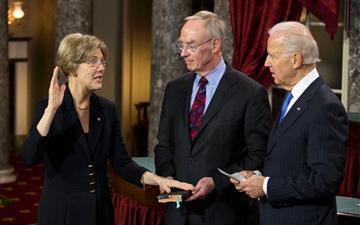
Photo Credit: Evan Vucci, AP
David DeCosse is the director of Religious and Catholic Ethics and Campus Ethics Programs at the Markkula Center for Applied Ethics. Views are his own.
Now that the Senate has acquitted President Trump along sharply partisan lines, what sense can we make of the fact that all Senators were required to take an oath before the trial began to do impartial justice?
The Constitution specifies that senators in an impeachment trial “shall be on Oath or Affirmation.” The oath can’t mean nothing. And it can’t be consistent with what Senator Mitch McConnell said in the weeks before the trial began, “I’m not an impartial juror.” Nor with McConnell’s before-trial promise of total coordination with the White House on strategy.
McConnell nevertheless took the oath. It’s not right to presume it meant nothing to him: Who can look into a person’s soul in such matters? But, given his pre-trial statements, it is fair to presume that taking the oath to McConnell didn’t mean what taking an oath meant to the great English statesman and Catholic saint Thomas More (as told in the play “A Man for All Seasons”): “When a man takes an oath, he’s holding his own self in his own hands like water, and if he opens his fingers then, he needn’t hope to find himself again.”
The words of the oath are taken from the 1868 Senate Rules for the impeachment trial of President Andrew Johnson. The oath reads: “I do solemnly swear (or affirm, as the case may be) that in all things appertaining to the trial of the impeachment of Donald J. Trump, now pending, I will do impartial justice according to the Constitution and laws: so help me God.”
I think it’s best to think of the oath in terms of an approach to evidence; of the role of a senator in our constitutional system; and of the legitimacy of the final verdict.
First, the oath requires that senators should put partisanship aside as much as possible and follow the evidence wherever it leads. Obviously, unless you live in an alternate universe, you know this is a huge ask in the current political moment. But I think the Framers were keenly aware of the possibility of such a moment—and of even worse.
And I think they included the oath in part to forestall the one clearly wrong answer to what the oath can mean in the face of such partisan rancor—nothing. “Nothing” as in we live in a relativist world and there’s nothing we can expect in such a trial other than an outcome dictated by partisan power.
Alexander Hamilton discusses the Senate’s role in an impeachment trial in Federalist #65 and offers a helpful way to think about impartiality in light of the partiality of partisanship: “…in such cases there will always be the greatest danger that the decision will be regulated more by the comparative strength of parties than by real demonstrations of innocence or guilt.” To be impartial, then, is to root a verdict in a “real demonstration” of evidence. That’s vague but not too vague. Hamilton could have left out the word “real.” By including it, he connected impartiality with intentional efforts to establish the truth.
The Constitution also specifies that senators in an impeachment trial are not jurors. “The trial of all crimes, except in cases of impeachment, shall be by jury,” Article III states. The apparent inference here is that senators are more like judges—even as they retain their character as legislators. As judges, they may be more active in the pursuit of truth in a way that characteristically more passive jurors may not. And such a pursuit of truth is to be done with impartiality.
But as legislators they also have a role-related obligation to impartial justice that follows from their place in the Constitutional order. Before they are Republicans or Democrats or Independents, they are senators. They neither represent the House of Representatives nor the president (even if they may be partial toward one or another).
Hamilton in Federalist #65 argued that impeachments should be tried in the Senate precisely because senators would be zealous in preserving their independent role in our Constitutional order and because that independence would ensure a more just outcome amid the intensity of partisan passions. “What other body,” Hamilton said, “would be likely to feel confidence enough in its own situation to preserve…the necessary impartiality between an individual accused and the representatives of the people, his accusers?”
To be sure, there are more rigorous extra-Constitutional tests of impartiality that could be devised for different aspects of the trial. My own favorite insists on a test of reciprocity: “Any senator who would vote to convict a president from the opposing party for specified misconduct must, consistent with their trial oath, vote to convict a president of their own party for the same misconduct.”
The oath may not specify such tests, but even in its lack of specificity it demands a lot: That justice may not be identified with partisan power. Justice judges power, not the other way around. By pointing to this ultimate standard, the oath stands like its own immovable judge over whatever way an impeachment trial finally goes. There is the verdict itself. But then there is the standard of impartial justice by which that verdict must be judged. Is the verdict founded on an impartial search for truth consistent with a “real demonstration” of guilt or innocence? Will the verdict have public legitimacy because of the impartiality of senators committed to their role-related obligations? The acquittal of President Trump falls under the judgment of this oath and doesn’t fare well.